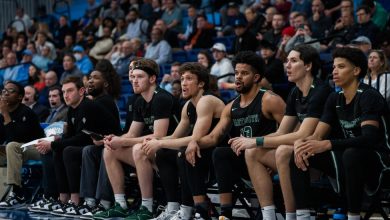‘All He’s Looking for Is a Sincere Shot’

During his first preseason as the Miami Dolphins’ head coach, in 2019, Brian Flores spoke with emotion about the social injustice he faced as a young Black and Latino man in the distressed Brownsville section of Brooklyn.
Referring to athletes like Kenny Stills, then a Dolphins receiver, and the ostracized quarterback Colin Kaepernick, Flores said he applauded those who protested against racial inequality and police brutality.
“They’re bringing attention to my story,” Flores, the son of Honduran immigrants, told reporters. “I’m the son of immigrants. I’m Black. I grew up poor. I grew up in New York during the stop-and-frisk era. I’ve been stopped because I fit a description before. So everything these guys protest, I’ve lived it, I’ve experienced it.”
Fired last month by the Dolphins, despite posting a winning record in two of his three seasons as head coach, and later experiencing what he described as a “sham” interview with the Giants, Flores now considers himself to have been stopped — or at least detoured — yet again because he fit a certain description.
On Tuesday, Flores, who will turn 41 this month, filed a proposed class-action lawsuit, accusing the N.F.L. of systemic racism in discriminating against him and other Black coaches in its hiring practices. In a 32-team league in which roughly 70 percent of the players are Black, only one current head coach — Mike Tomlin of the Pittsburgh Steelers — is Black.
Nine teams had head coach openings in this year’s hiring cycle, and of the six teams that have already made a hire or have reportedly decided on one, the job went to a white man.
Harry Edwards, the prominent sociologist and social activist who is a longtime consultant to the San Francisco 49ers said, “We stand on the precipice of having more African Americans on the United States Supreme Court than as head coaches in the N.F.L. That is outrageous.”
Flores’ lawyers did not make him available for an interview. He said in multiple television appearances that real change won’t come from policy edicts but only through changing “the hearts and minds” of the N.F.L.’s principal team owners. Only two are not white — Shahid Khan of the Jacksonville Jaguars, a Pakistani American, and Kim Pegula of Buffalo, a Korean American who owns the Bills with her husband, Terry.
Some who have known Flores for many years, including Dino Mangiero, his high school coach at Poly Prep Country Day School in Brooklyn, say that he has long had a finely honed sense of moral purpose. Mangiero described Flores as “serious as a heart attack” and “a man of principle who, if he feels something’s not right, he’s not going to stand for it.”
“I think all he’s looking for is a sincere shot,” said Mangiero, 63, who played six seasons in the N.F.L. and recently signed to coach Archbishop McCarthy High School in Southwest Ranches, Fla. “I’m very proud of him. He’s standing up for what he believes in. That takes a lot of courage. His career is on the line, no doubt about it.”
As Flores stares down an uncertain future, the friends he has kept since his days at Poly Prep have rallied around him. Clifton Coker, who like Flores attended the private school through a scholarship program for promising student-athletes, said Flores relied on mentors and trying to do things the right way to reach his career goals. “For something to not feel right, and in the direction that he’s been taught to believe, it’s disheartening,” Coker said.
After graduating from Boston College, where a leg injury ended any slim hopes of playing in the N.F.L. as a safety or linebacker, Flores joined the New England Patriots’ staff in 2004. He started as a scouting assistant, transporting players to and from the airport, picking up dry cleaning, sleeping on an air mattress in a friend’s attic.
But even then, Scott Pioli, New England’s vice president of player personnel at the time, saw Flores’s take-charge nature. Before the Super Bowl in 2019, Pioli, who had left New England by then, said that he used to jokingly call Flores “the union leader” and “Jimmy Hoffa.” If any of the scouting assistants had an issue or a question, Flores brought it up with Pioli.
Nate Solder, who won two Super Bowls in New England as an offensive tackle and who has played most recently for the Giants, recalled in an interview Flores’s sense of fairness. Once, Solder said, Flores rankled the Patriots’ veteran offense line in practice by placing his foot on the ball and disrupting the hurry-up offense so he could set up the scout-team defense.
“I’ll spare the language but it was intense,” Solder said. “It was like, ‘I will fight you over this. I don’t care. I’m going to do this right.’”
During a training camp practice in 2019, Flores famously played eight consecutive songs by the Brooklyn-born Jay-Z after Stills criticized the rapper as tone deaf when he entered into an entertainment and social justice partnership with the N.F.L. Jay-Z said the league had “moved past kneeling” for the anthem, which irritated Stills, who did kneel in protest of racial inequities.
Flores received some criticism, including from the editorial page of The Miami Herald, which likened his choice of music to “a smirking taunt, giving the back of his hand to a real-life American plague” of police brutality.
Flores was unapologetic, saying he was challenging Stills to not let the outside world affect his performance. His own sense of rectitude, Flores said in 2019, shortly before his mother, Maria, died of breast cancer, had been instilled by her unwavering values. Maria Flores raised five sons while the family patriarch, Raul Sr., was away for months at a time as a merchant marine.
Education was foremost. Four of the Flores siblings, including Brian, earned master’s degrees. His mother, he said, never seemed to flinch, even when she and her children had to walk up 20 flights of stairs, sometimes carrying groceries, when the elevators broke at the Glenmore Plaza housing complex in Brownsville.
“She impacted me in an extremely positive way on how to treat people and how to lead with honor and integrity and do things the right way, always,” Flores said.
He spent 15 seasons on the Patriots’ staff, became the defensive play-caller, and was part of four Super Bowl champion teams. Then at age 37, he was hired by the Dolphins, becoming one of just three Black head coaches at the time. Since the so-called Rooney Rule was enacted in 2003 to spur more inclusive hiring, 27 of the 127 available head coaching jobs in the N.F.L., or about 21 percent, have been filled by people of color, according to The Associated Press.
By 40, Flores was fired. Stephen Ross, the team owner, said, “an organization can only function if it’s collaborative and works well together.” Flores reportedly had a strained relationship with Chris Grier, the Dolphins’ general manager, and Tua Tagovailoa, the team’s starting quarterback. Not every player liked his intense style of coaching.
In television interviews since his firing, Flores has spoken with a sense of betrayal, using words like humiliation, disbelief, hurt, anger. The classic immigrant assurance his mother had given him — work hard and opportunity will come — has, in his view, been warped.
Ross pressured him to tank the 2019 season for a better first-round draft pick, offering him $100,000 for each defeat, a proposition he declined, Flores said in his lawsuit. And he cited text messages he said were sent by his former boss, New England Coach Bill Belichick on Jan. 24. In the messages, Belichick appeared to congratulate Flores on being hired as the Giants’ coach, a job he had yet to have his Jan. 27 interview for. The messages seemed to indicate that Belichick had intended the correspondence for another Brian — Brian Daboll, who is white and was hired by the Giants.
Ross called Flores’s allegations “false, malicious and defamatory.” The Giants said Thursday that they had “concrete and objective evidence” that their coaching decision was not made until the day after Flores interviewed, and that his claims are “disturbing and simply false.” But some other former Black coaches in the N.F.L., Hue Jackson and Marvin Lewis, have spoken of the familiarity of Flores’s despair. And Solder, who is white, was among players who tweeted in support of Flores.
“I have no doubt what he’s describing is totally accurate,” Solder said in an interview.
Legal experts say Flores’s case will be difficult to win unless he can prove that race was a factor in being turned down for jobs.
Edwards, the sociologist, said it seems likely that Flores will face the same resistance encountered by Curt Flood, the St. Louis Cardinals center fielder who lost his legal challenge in the 1970s to overturn Major League Baseball’s reserve clause, which bound players to one team for their entire careers. Free agency came eventually, but at a great professional and personal cost to Flood.
And now Flores faces the risk of not coaching again.
“We’re so mired in racism and the traditions of exclusion and turning those who stand up against it into martyrs, that we say that is to be an expected price for standing up,” Edwards said.
Richard Lapchick, the director of The Institute for Diversity and Ethics in Sport at the University of Central Florida, described Flores as “the coaching equivalent of Kaepernick,” saying he could not see Flores being offered another coaching job in the short term, possibly ever.
But, Lapchick added in a more hopeful tone, athlete activism that intensified during the racial reckoning that followed the murder of George Floyd in May 2020 could turn its attention to the hiring practices of college and professional teams.
“Not that they would demand that they hire a Black coach,” Lapchick said, “but that they open up the process to assure there was a fair process, which usually ends up with more diverse candidates and more diverse choices.”





